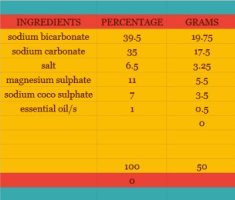Sascha6990
Member
- Joined
- Dec 8, 2020
- Messages
- 141
I never liked commercial laundry detergents and the thing I hated the most was the incredibly long lasting artificial scents which I now know are estrogenic. For me that was sufficient reason to ditch them and learn how to make my own. Of course, there are a lot of natural laundry detergents available but making your own is cost-effective, satisfying and fun.
I started researching making laundry detergent that is suitable for the washing machine in 2022. Pretty soon into my research I found out using soap flakes is not a good idea because of the buildup on the clothes and pipes. So I found a recipe without soap which only contained a combination of salts (sodium bicarbonate, sodium carbonate, magnesium sulphate and regular salt or sea salt) along with some essential oil. I found it to work great only for clothes that are not very dirty and just need refreshing. I started wondering what could be the problem and I noticed the recipe doesn't contain any actual surfactants, the salts only act as water softeners and deodorizers.
So I made my own formula and I'm sharing it with you because I found it to be effective both at cleaning dirt and refreshing clothes. The formula contains 1% essential oils which although estrogenic, are volatile and will only last until the clothes are dry. Some of them enhance the cleaning power and/or are antibacterial, for example tea tree, lime, lavender, etc.
I chose to use sodium coco sulphate as a surfactant because it is strong, naturally-derived and easily available at natural ingredients suppliers in my country. Increasing its percentage in the formula will increase cleaning power but also foaming. Please note that this formula, although effective in cleaning dirt, is not a stain remover. Commercial detergents contain enzymes (proteases, amylases, lipases, etc.) to break down all kinds of stains. I usually use Marseille soap for stain removal before tossing the garment in the machine. Bovine bile soap is also good, especially for fat-based stains.
I prefer making the quantity needed (50g) for a 5kg load, medium dirty, each time because if you make a lot and keep it in a jar the heavier ingredients will settle at the bottom. For convenience, I also measured approximate volumes which I will give below.
This is the formula, sorry, excel files are not accepted. Suggestions for improving it are welcomed.
Recipe in volumes, standard cooking measuring spoons, leveled:
- 1 tbsp sodium bicarbonate
- 1 tbsp sodium carbonate
- 1/2 tsp salt
- 1 tsp magnesium sulphate
- 1 tsp sodium coco sulphate
- aprox 10 drops essential oil/s
I started researching making laundry detergent that is suitable for the washing machine in 2022. Pretty soon into my research I found out using soap flakes is not a good idea because of the buildup on the clothes and pipes. So I found a recipe without soap which only contained a combination of salts (sodium bicarbonate, sodium carbonate, magnesium sulphate and regular salt or sea salt) along with some essential oil. I found it to work great only for clothes that are not very dirty and just need refreshing. I started wondering what could be the problem and I noticed the recipe doesn't contain any actual surfactants, the salts only act as water softeners and deodorizers.
So I made my own formula and I'm sharing it with you because I found it to be effective both at cleaning dirt and refreshing clothes. The formula contains 1% essential oils which although estrogenic, are volatile and will only last until the clothes are dry. Some of them enhance the cleaning power and/or are antibacterial, for example tea tree, lime, lavender, etc.
I chose to use sodium coco sulphate as a surfactant because it is strong, naturally-derived and easily available at natural ingredients suppliers in my country. Increasing its percentage in the formula will increase cleaning power but also foaming. Please note that this formula, although effective in cleaning dirt, is not a stain remover. Commercial detergents contain enzymes (proteases, amylases, lipases, etc.) to break down all kinds of stains. I usually use Marseille soap for stain removal before tossing the garment in the machine. Bovine bile soap is also good, especially for fat-based stains.
I prefer making the quantity needed (50g) for a 5kg load, medium dirty, each time because if you make a lot and keep it in a jar the heavier ingredients will settle at the bottom. For convenience, I also measured approximate volumes which I will give below.
This is the formula, sorry, excel files are not accepted. Suggestions for improving it are welcomed.
Recipe in volumes, standard cooking measuring spoons, leveled:
- 1 tbsp sodium bicarbonate
- 1 tbsp sodium carbonate
- 1/2 tsp salt
- 1 tsp magnesium sulphate
- 1 tsp sodium coco sulphate
- aprox 10 drops essential oil/s

